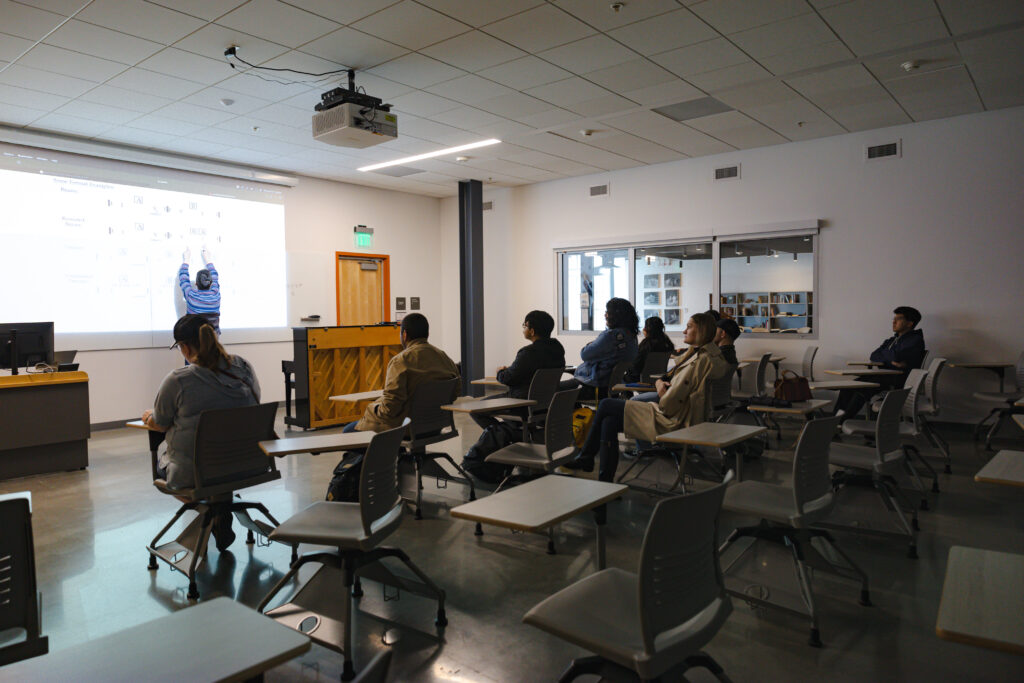
Black teachers: How to recruit them and make them stay

Lessons in higher education: What California can learn

Keeping California public university options open

Superintendents: Well-paid and walking away

The debt to degree connection

College in prison: How earning a degree can lead to a new life

The University of California is joining a national initiative to offer free online courses to students at low-income high schools across the country beginning next year.
The university system is joining the National Education Equity Lab and beginning in the winter term of 2024 will offer two for-credit classes to students enrolled in Title I schools, a federal designation for schools with high numbers of low-income students, UC’s board of regents learned Wednesday. UC is hopeful that the program will allow students — who might not otherwise have access to college courses — the opportunity to take UC classes and get a taste of college.
The classes are free to students, but the participating high schools will need to pay a fee of $250 per student to the equity lab to cover administrative and support costs.
The specific classes that will be offered haven’t yet been determined, but they will be for college credit and are existing courses developed by UC faculty. Currently, 12 other universities participate in the national program. The classes available to students include a poetry course from Harvard, an environmental studies course from Howard University and a bioengineering course from Stanford.
UC will be the second public university to join the partnership and also the second university from California, joining Stanford.
The program will allow the university to expand access to low-income high school students who might not otherwise have a chance to take rigorous courses, said Rolin Moe, executive director of UC Online.
“These courses are focused on establishing that love of learning and that opportunity to show people that they can succeed in college,” Moe added. “A student who gets to say, ‘I took a course from Berkeley,’ or ‘I took a course from Santa Cruz,’ what that means for somebody internally and intrinsically could be all the difference.”
UC faculty will be responsible for creating the course syllabus and course materials as well as developing assessments. Teaching fellows, including UC undergraduate and graduate students, will help facilitate the courses by leading Zoom sessions, grading student work and answering questions. Teachers at the local high schools will also work with UC faculty to help facilitate the courses.
Students across the country and in California can already access college courses through dual enrollment programs that are offered mainly by community colleges. One regent, Jose Hernandez, said during Wednesday’s meeting that he’s concerned UC is “late to the game” and that community colleges have already “cornered the market” when it comes to offering college courses to students still enrolled in high school.
UC’s courses will be different from traditional dual enrollment courses, said Yvette Gullatt, UC’s vice president for graduate and undergraduate affairs, because they will be classes and subjects that students “can’t get in high school or community college.”
She said the courses “resemble our university deep dive courses. These are the things our faculty do so very well. This is their research in the classroom. This is their teaching. So this goes beyond our traditional A through G and our general ed and into those spaces where our faculty’s teaching and research come together.”
The program will also be reaching different students. The students who typically enroll in dual enrollment courses “tend to be a much more middle class constituency,” whereas the UC program will be targeted to low-income students, said Katherine Newman, UC’s provost and executive vice president of academic affairs.
“And it’s that connection to the university world, the four-year university world that I think is going to make this particularly attractive,” Newman added.

The overreliance on undersupported part-time faculty in the nation’s community colleges dates back to the 1970s during the era of neoliberal reform — the defunding of public education and the beginning of the corporatization of higher education in the United States. Decades of research show that the systemic overreliance on part-time faculty correlates closely with declining rates of student success. Furthermore, when faculty are… read more

Panelists discussed dual admission as a solution for easing the longstanding challenges in California’s transfer system.

A grassroots campaign recalled two members of the Orange Unified School District in an election that cost more than half a million dollars.

Legislation that would remove one of the last tests teachers are required to take to earn a credential in California passed the Senate Education Committee.
Comments (1)
Comments Policy
We welcome your comments. All comments are moderated for civility, relevance and other considerations. Click here for EdSource's Comments Policy.
Kevin 7 months ago7 months ago
The headline is misleading. Makes it sound like college classes wouldn’t be offered to less disadvantaged kids. Should be, University of California to offer *free* college classes to low-income high school students.